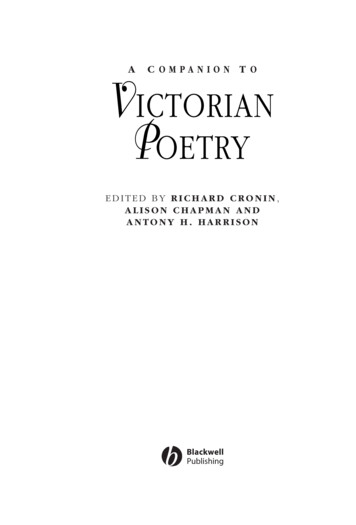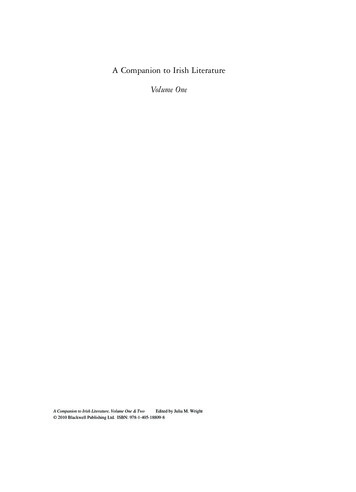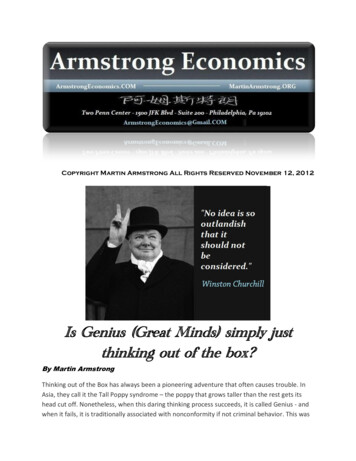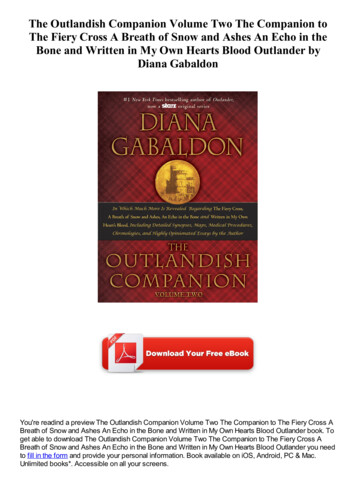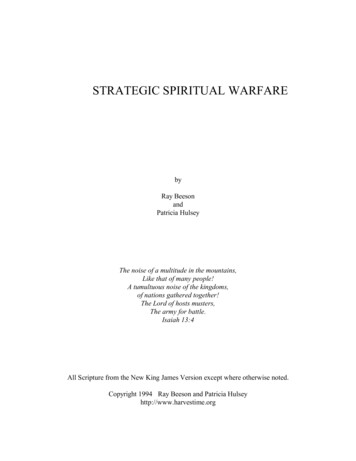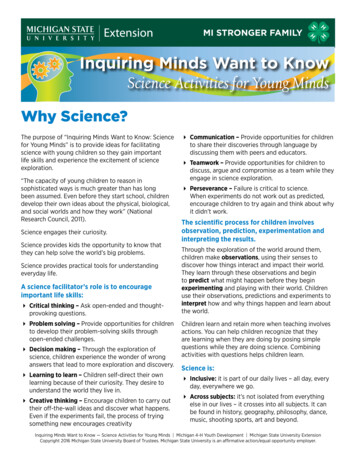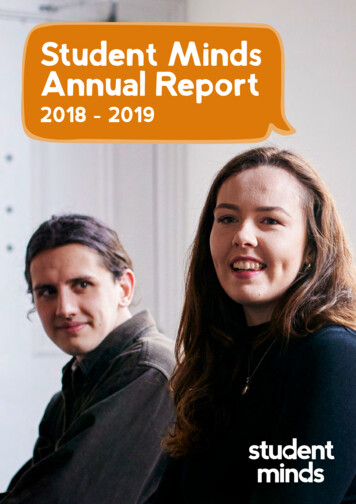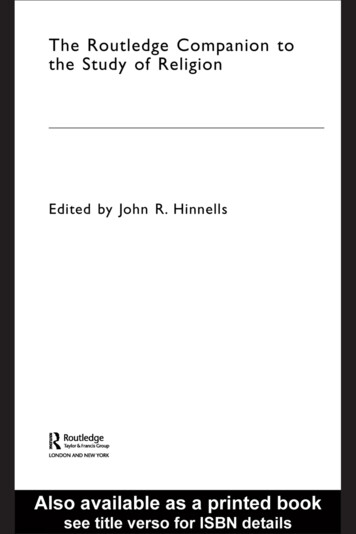
Transcription
Recto running 12345671iThe Routledge Companionto the Study of Religion‘A companion in the very best sense of the word: it provides the reader with excellent guidesand mentors to walk alongside on the path to understanding. . . . The result is an intelligent,fair-minded, thorough, and cutting-edge exploration of the field of religious studies.’Wendy Doniger, Mircea Eliade Distinguished ServiceProfessor of the History of Religions, University of Chicago‘This is a very rich Companion to the Study of Religion. The survey of key approachesprovides an excellent introduction for students and others, while the chapters show thereader why and where the study of religion is relevant to our contemporary situation.’Willem B. Drees, Professor of Philosophy of Religionand Ethics, Leiden University, the NetherlandsThe Routledge Companion to the Study of Religion is a major resource for everyone taking coursesin religious studies. It begins by explaining the most important methodological approaches toreligion – including psychology, philosophy, anthropology and comparative study – beforemoving on to explore a wide variety of critical issues, such as gender, science, fundamentalism,ritual and new religious movements. Written by renowned international specialists, and usingclear and accessible language throughout, it is an excellent guide to the problems and questionsfound in exams and on courses. Surveys the history of religious studies and the key disciplinary approachesHighlights contemporary issues such as globalization, diaspora and politicsExplains why the study of religion is relevant in today’s worldA valuable resource for courses at all levelsJohn R. Hinnells is Professor of the Comparative Study of Religions at Liverpool HopeUniversity, and was previously professor at SOAS and the University of Manchester. Hisspecialist research area is Zoroastrianism and the Parsis, on which he has written, amongothers, The Zoroastrian Diaspora (2005), Zoroastrian and Parsi Studies (2000) and Zoroastriansin Britain (1996). He is also the editor of various works, including The New Penguin Handbookof Living Religions (2000), The Penguin Dictionary of Religions (1997), Who’s Who of Religions(1996) and the Routledge Library of Religious Beliefs and Practices series.Contributors: Eric Sharpe, Robert Segal, David Ford, Peter Vardy, Donald Wiebe, MartinRiesebrodt, Mary Ellen Konieczny, Rosalind Hackett, Daniel Merkur, Douglas Allen, WilliamE. Paden, Darlene Juschka, Kim Knott, Paul Heelas, Richard King, Judith Fox, Henry Munson,Paul Gifford, Garrett Green, Michael Barnes, George Moyser, Christopher Park, ThomasDixon, Luther Martin, Mark Hulsether, Seán McLoughlin.
611
5671Recto running headThe Routledge Companion tothe Study of ReligionEdited by John R. Hinnellsiii
11First published 2005 by Routledge2 Park Square, Milton Park, Abingdon, Oxon OX14 4RNSimultaneously published in the USA and Canadaby Routledge270 Madison Ave, New York, NY 10016Routledge is an imprint of the Taylor & Francis GroupThis edition published in the Taylor & Francis e-Library, 2005.“To purchase your own copy of this or any of Taylor & Francis or Routledge’scollection of thousands of eBooks please go to www.eBookstore.tandf.co.uk.” 2005 John R. Hinnells for selection and editorial material; individualcontributors their contributionsAll rights reserved. No part of this book may be reprinted or reproduced orutilized in any form or by any electronic, mechanical, or other means, nowknown or hereafter invented, including photocopying and recording, or in anyinformation storage or retrieval system, without permission in writing from thepublishers.British Library Cataloguing in Publication DataA catalogue record for this book is available from the British LibraryLibrary of Congress Cataloging in Publication DataThe Routledge companion to the study of religion /edited by John Hinnells.p. cm.1. Religion – Study and teaching. I. Hinnells, John R.BL41.R685 2005200'.71 – dc22ISBN 0-203-41269-9 Master e-book ISBNISBN 0-203-67171-6 (Adobe eReader Format)ISBN 0–415–33310–5 (hbk)ISBN 0–415–33311–3 (pbk)II. Title.2004023489
Recto running 12345671vContents1Notes on contributorsixIntroduction1Why study religions?5JOHN R. HINNELLS2 The study of religion in historical perspective21ERIC J. SHARPEPART 1Key approaches to the study of religions3 Theories of religion4749ROBERT A. SEGAL4 Theology61DAVID F. FORD5 Philosophy of religion80PETER VARDY6 Religious studies98DONALD WIEBE7 Sociology of religion125MARTIN RIESEBRODT AND MARY ELLEN KONIECZNY8 Anthropology of religion144ROSALIND I. J. HACKETT9 Psychology of religion164DAN MERKUR10 Phenomenology of religionDOUGLAS ALLEN182
611viContents11 Comparative religion208WILLIAM E. PADENPART 2Key issues in the study of religions12 Gender227229DARLENE M. JUSCHKA13 Insider/outsider perspectives243KIM KNOTT14 Postmodernism259PAUL HEELAS15 Orientalism and the study of religions275RICHARD KING16 Secularization291JUDITH FOX17 Mysticism and spirituality306RICHARD KING18 New religious movements323JUDITH FOX19 Fundamentalism337HENRY MUNSON20 Myth and ritual355ROBERT A. SEGAL21 Religious authority: scripture, tradition, charisma379PAUL GIFFORD22 Hermeneutics392GARRETT GREEN23 Religious pluralism407MICHAEL BARNES24 Religion and politics423GEORGE MOYSER25 Religion and geography439CHRIS PARK26 Religion and scienceTHOMAS DIXON456
89401234567127 Religion and cognitionvii473LUTHER H. MARTIN28 Religion and culture489MARK HULSETHER29 Religion and the arts509JOHN R. HINNELLS30 Migration, diaspora and transnationalism: transformations ofreligion and culture in a globalising age526SEÁN MCLOUGHLINIndex550
611
Recto running 12345671ixNotes on contributorsDouglas Allen, Professor of Philosophy at the University of Maine, is author andeditor of over ten books, including Structure and Creativity of Religion and otherbooks focusing on phenomenology of religion. He served as President of theInternational Society for Asian and Comparative Philosophy (2000–3) and hashad Fulbright and Smithsonian grants to India. His most recent book is Myth andReligion in Mircea Eliade (Routledge 2002).Michael Barnes studied Theology at Heythrop College in the University of Londonand Indian Religions at the University of Oxford. After doctoral studies inCambridge he now teaches Theology and Religious Studies at Heythrop and runsa small inter-faith centre in Southall, West London.Thomas Dixon is a Lecturer in History at Lancaster University. His first book, FromPassions to Emotions: The Creation of a Secular Psychological Category was publishedby Cambridge University Press in 2003. His teaching and research interests includetopics in the histories of science, religion, ethics and political thought, especiallyin Britain and America from the eighteenth to the twentieth centuries.David F. Ford is Regius Professor of Divinity at the University of Cambridge. Heis the author of numerous books, including: Theology: A Very Short Introduction(2000), Self and Salvation: Being Transformed (1999), The Shape of Living (1997),Meaning and Truth in 2 Corinthians (1988, with Frances M. Young), Jubilate:Theology in Praise (1984, with Daniel W. Hardy) and Barth and God’s Story: BiblicalNarrative and the Theological Method of Karl Barth in the Church Dogmatics (1981).He also directs the Cambridge Interfaith Programme and is a member of theeditorial board of Modern Theology and Scottish Journal of Theology.Judith Fox is an independent academic who has researched South Asian new religiousmovements for over twenty years. In addition to journal articles and contributionsto edited volumes, she has recently produced Sahaja Yoga (Richmond: Curzon Press1999) and Osho Rajneesh (Salt Lake City: Signature Books 2002).Paul Gifford teaches in the Department of the Study of Religions of the School ofOriental and African Studies (SOAS) at the University of London. He haspublished widely on Christianity in Africa, religion and development and on therole of scripture in religion.
611xNotes on contributorsGarrett Green is the Class of 1943 Professor of Religious Studies at ConnecticutCollege (New London, Connecticut). He is the author of Imagining God: Theologyand the Religious Imagination (1989, 1998) and Theology, Hermeneutics, andImagination: The Crisis of Interpretation at the End of Modernity (2000).Rosalind I. J. Hackett is a distinguished Professor in the Humanities at the Universityof Tennessee, Knoxville, where she teaches courses in Religious Studies andAnthropology. She has published widely on new religious movements in Africa(New Religious Movements in Nigeria, ed. 1987), as well as on religious pluralism(Religion in Calabar, 1989), art (Art and Religion in Africa 1996), religion in relation to human rights (Religious Persecution as a U.S. Policy Issue, co-edited, 1999),as well as gender, the media, conflict and violence. She is Vice President of theInternational Association for the History of Religions.Paul Heelas, a Sociologist of Religion, has a longstanding interest in spirituality andreligion in the West. Having published The New Age Movement (1996) andSpiritualities of Life (2005) (the latter together with Linda Woodhead), he iscurrently embarking on a volume which will complete his trilogy with Blackwell.His approach to the study of spirituality has gravitated from emphasizing the sacralization of the self to emphasizing the sacralization of life.John R. Hinnells is Professor of the Comparative Study of Religions at LiverpoolHope University and was previously professor at SOAS and the University ofManchester. His specialist research area is Zoroastrianism and the Parsis, on whichhe has written, among others, The Zoroastrian Diaspora (2005), Zoroastrian and ParsiStudies (2000) and Zoroastrians in Britain (1996). He is also the editor of variousworks, including The New Penguin Handbook of Living Religions (2000), The PenguinDictionary of Religions (1997), Who’s Who of Religions (1996) and the RoutledgeLibrary of Religious Beliefs and Practices series.Mark Hulsether is Associate Professor of Religious Studies and American Studiesat the University of Tennessee, Knoxville. He is the author of Building a ProtestantLeft: Christianity and Crisis Magazine, 1941–1993 and many articles on religion,culture and politics in the United States.Darlene M. Juschka teaches in Women’s Studies and Religious Studies at the University of Regina. She has recently published ‘The Writing of Ethnography: MagicalRealism and Michael Taussig’ in Journal for Cultural and Religious Theory and hasan edited volume Feminism and the Study of Religion: A Reader (Continuum, 2001).Richard King is the author of four books including Early Advaita Vedanta andBuddhism. The Mahayana Context of the Gaudapadiyakarika (State University of NewYork Press, 1995), Indian Philosophy. An Introduction to Hindu and Buddhist Thought(Edinburgh and Georgetown University Presses, 1999/2000), Orientalism andReligion. Postcolonial Theory, India and ‘the Mystic East’ (London and New York:Routledge, 1999) and Selling Spirituality The Silent Takeover of Religion (co-authoredwith Dr Jeremy Carrette, Routledge 2004). Dr King has published numerousarticles on Hindu and Buddhist thought, postcolonial approaches to the study ofreligion and the study of mysticism. He has served as Head of Religious Studies
Notes on 4567894012345671xiat Stirling and Derby Universities and is currently Associate Professor of ReligiousStudies at Vanderbilt University, Tennessee.Kim Knott is Professor of Religious Studies at the University of Leeds, and Directorof the Community Religions Project. Her current interests are in religion, localityand space, and research methods in the study of religions. She is author of TheLocation of Religion: A Spatial Analysis (Equinox, 2005), Hinduism: A Very ShortIntroduction (1998), and other books and articles on religions in Britain, new religious movements and gender and religion.Mary Ellen Konieczny is a Ph.D. candidate in Sociology at the University of Chicago.Her dissertation, The Spirit’s Tether: Orthodoxy, Liberalism and Family amongAmerican Catholics, is an ethnographic study exploring how religion shapes perceptions and practices of gender relations, sexuality and childrearing among middleclass Catholics. She has worked on the National Congregations Study, and herpublished papers include ‘Resources, Race and Female-Headed Congregations inthe United States’ in the Journal for the Scientific Study of Religion (2000).Dr Seán McLoughlin is Lecturer in South Asian, Islamic and Religious Studies inthe Department of Theology and Religious Studies at the University of Leeds. Heholds a Ph.D. in Social Anthropology (Manchester) and is author of variousarticles on the Muslim presence in Britain. His first book is Representing Muslims:Religion, Ethnicity and the Politics of Identity (Pluto Press, London).Luther H. Martin is Professor of Religion at the University of Vermont. He is theauthor of Hellenistic Religions (1987) and of numerous articles in this area of hishistorical specialization. He has also published widely in the field of theory andmethod in the study of religion, most recently co-editing Theorizing Religions Past:Archaeology, History, and Cognition (2004). He is also co-editor of a series on TheCognitive Science of Religion (AltaMira Press).Dan Merkur is a psychoanalyst in private practice in Toronto and a Research Readerin the Study of Religion at the University of Toronto. He has taught at fiveuniversities and published nine books in the history and/or psychoanalysis ofreligion, including Psychoanalytic Approaches to Myth (2004).George Moyser is Professor and Chair of the Department of Political Science at theUniversity of Vermont. He has published several books and numerous articles onthe relationship of religion and politics including, Politics and Religion in the ModernWorld (Routledge), Church and Politics in a Secular Age (The Clarendon Press) andChurch and Politics Today (T & T Clark).Henry Munson is Professor of Anthropology at the University of Maine. He was aVisiting Scholar in Anthropology at Harvard University in 2003–4. He is theauthor of The House of Si Abd Allah: The Oral History of a Moroccan Family (1984),Islam and Revolution in the Middle East (1988) and Religion and Power in Morocco(1993). He is currently writing a book on the roots of Islamic militancy.William E. Paden is Professor and Chair, Department of Religion, at the Universityof Vermont. He is the author of Interpreting the Sacred: Ways of Viewing Religion,and Religious Worlds: The Comparative Study of Religion, and numerous articles ontheory and method.
611xiiNotes on contributorsChris Park is a Professorial Fellow and Director of the Graduate School at LancasterUniversity, England. A graduate of the Universities of Ulster and Exeter, he hastaught Geography at Lancaster for more than two decades, and has publishedwidely within the environmental field, including the popular textbook TheEnvironment: Principles and Applications (Routledge, 2nd edn 2001). His 1994 bookSacred Worlds: An Introduction to Geography and Religion (Routledge) is one of thefew academic books that deal with the subject.Martin Riesebrodt has been Professor of Sociology at the University of Chicagosince 1990. Among his publications are Pious Passion. The Emergence of ModernFundamentalism in the United States and Iran, translated by Don Reneau (1993),Die Rückkehr der Religionen. Fundamentalismus und der Kampf der Kulturen (2000)and Max Webers Religionssystematik, edited with Hans Kippenberg, (2001).Robert A. Segal is Professor of Theories of Religion at the University of Lancaster,where he has taught since emigrating from the US in 1994. He is the author of ThePoimandres as Myth (1986), Religion and the Social Sciences (1989), Joseph Campbell(rev. edn 1990), Explaining and Interpreting Religion (1992), Theorizing about Myth(1999), and Myth: A Very Short Introduction (2004). He is the editor of The GnosticJung (1992), The Allure of Gnosticism (1995), The Myth and Ritual Theory (1998),Jung on Mythology (1998), Hero Myths (2000) and the Blackwell Companion to theStudy of Religion (forthcoming). He is also European Editor of Religion.Eric J. Sharpe, in his early career, taught at the Universities of Lancaster andManchester. In 1977 he was appointed to the First Chair of Religious Studies inAustralia, at the University of Sydney, which he held until his retirement in 1996.His publications in the fields of religious studies and missiology include ComparativeReligion: A History (1975), Understanding Religion (1983), Karl Ludvig Reichelt,Missionary, Scholar and Pilgrim (1984) and Nathan Söderblom and the Study of Religion(1990). Eric Sharpe died on 19 October, 2000, only days after completing hischapter in this book.Peter Vardy is regarded as one of the leading experts on Religious and Values Educationin Britain, Australia and New Zealand. He is the Vice Principal of Heythrop College,University of London where he lectures in Philosophy of Religion. He has publishedmany books and articles, including What is Truth? (John Hunt Publishing) andBeing Human (Darton Longman and Todd) and he has co-written The Thinkers Guideto Evil and The Thinkers Guide to God (John Hunt Publishing) with Julie Arliss.He is the series editor of Fount Christian Thinkers and consulting editor of DialogueAustralasia. Peter is a former President of the London Society for the Study ofReligions and a member of the Society for the Study of Theology as well as a foundermember of the British Society for Philosophy of Religion.Donald Wiebe is Professor of the Philosophy of Religion in the Faculty of Divinity atTrinity College (University of Toronto). He is the author of Religion and Truth:Towards an Alternative Paradigm for the Study of Religion (1981), The Irony of Theologyand the Nature of Religious Thought (1991), Beyond Legitimation: Essays on the Problemof Religious Knowledge (1994) and The Politics of Religious Studies: The ContinuingConflict with Theology in the University (1998) as well as numerous scholarly articlesand reviews. He edits the series Toronto Studies in Religion for Peter Lang Press.
Recto running 123456711IntroductionReligions do not exist, nor are they studied, in a vacuum. While this book was beingprepared major international events have rocked religions and societies: the attackon the Twin Towers in New York and on the Pentagon on 9/11; the war inAfghanistan, ever more brutal battles between Palestinians and Jews and the invasion of Iraq appear to have pitched three religions against each other Judaism,Christianity and Islam; bombs in Bali and Kenya, conflict in the Sudan, the openingup of the old Soviet Union to Christian missionaries – and to New ReligiousMovements – have given religions a huge, and often frightening, prominence on aglobal basis.This book looks at the many perspectives from which religions may be viewed. Itstarts by looking at different answers to the question ‘why study religion?’. It thenconsiders how the study of religion(s) has developed – it is important to know howwe got to where we are in a subject and how scholars have theorized about religion.The chapter by Eric Sharpe maps the historical picture of the growth of religiousstudies. Contrary to popular imagination there are many disciplines or approachesinvolved in the study of religions; each is discussed here in a separate chapter. Theobvious routes are theology and religious studies, though there is much debate aboutthe relationship between the two. In America there are indications of a growingdifference, whereas in Britain the two appear to be coming closer together as can beseen in their respective chapters in this book (Ford and Wiebe). Authors were askedto look particularly at recent developments in their subjects; Rosalind Hackett exemplifies this in her chapter on anthropology by avoiding the all-too-common tourof nineteenth-century theorists. There are various social and/or scientific ways ofstudying religions – sociologically (Riesebrodt and Konieczny), anthropologicallyor by use of philosophy (Vardy) and through phenomenology (a term used byAllen slightly differently in religious studies from its use in ‘straight’ philosophy).‘Psychology of religion’ is an umbrella term for a number of approaches, which arediscussed in the article by Merkur. William Paden, author of two of the most widelyused books on comparative religion, has authored the chapter on that subject here.Whichever methodological approach one pursues, there are a number of key issuesaddressed by scholars involved with religions. Gender has obviously become a majortopic (Juschka). Across many disciplines and subjects, postmodernism (Heelas) hasbecome a way of addressing questions that simply cannot be ignored; in a similarmanner, postcolonialism and Orientalism (King) have been influential in the reassessment of world-views. A question perhaps more specific to religious studies is that of
6112Introductionthe merits and problems of an ‘insider’s’ perspective and understanding of a religionor culture, compared with that from the outside (Knott). In the 1960s and 1970sthere was much debate on the processes of secularization, which contrasted with thegrowth of interest in spirituality, mysticism (King) and a proliferation of NewReligious Movements (Fox). Contrary to what ‘rationalist’ approaches to societymight have expected, fundamentalism (often a misused term), seems to have becomemore prominent in various cultures and countries (Munson). Old – and new – mythsand rituals are interpenetrating and central to most religions and cultures (Segal).The question of authority is a major feature in many traditions, both in the senseof religious individuals and their charisma, and in terms of the established authorities and texts (Gifford). Of course, texts are not static; the words may not change,but their interpretation does – an issue at the heart of hermeneutics (Green).Religions do not exist in a vacuum, so six chapters then consider how religions havebeen involved in, interacted with or been seen through the prism of politics (Moyser),geography and geographical conditions (Park), advances in scientific discoveries andthought (Dixon), culture (Hulsether) and the arts (Hinnells). The chapter on religion and cognition by Martin looks at one of the most challenging forms of currentapproaches to religious studies. Back in the 1960s and 1970s international migrationincreased dramatically. It was assumed by many that migrants would, over a coupleof generations, ‘assimilate’ and leave their religion behind. The reverse has happened,resulting in a growth in the study of diasporas around the globe (McLoughlin). Asreligions have met and interacted – and sometimes experienced tensions – so religious pluralism has become a question that many people have had to address (Barnes).There have been numerous debates about definitions and presuppositions in thestudy of religion. Many scholars have questioned whether there is any such ‘thing’as religion, there are only the religions. But some have gone further and questionedthe value of the term ‘religion’ at all. In various languages, in Sanskrit for example,there is no word for ‘religion’. Is ‘religion’ a Western construct imposed on variouscultures as a part of intellectual imperialism? It has been said that ‘words mean whatwe want them to’. My own opinion is that the word ‘religion’ is useful, but shouldbe used with caution.The ease of travel and large migrations to and from many countries have resultedin ‘globalization’, the interaction of cultures at a global level. ‘The other’ is encountered more often, more closely and by more people than ever before. Whereas some‘religions’ were remote and exotic now they are part of the local scenery for manyof us.Students on many courses become fretful when studying theory and method.However, the more complex the subject, the more important such areas become. Whenthat subject is one as full of sensitivities, presuppositions and prejudices as the study ofreligion is, then it is essential that, from the outset, the student is alerted to debatesand doubts, and that key issues, motives, aims and beliefs are foregrounded – that iswhy my own assumptions and interests are articulated frankly and explicitly in the firstchapter. I spent much time reflecting on the value of a section on the definition ofimportant terms, for example ‘religion’. But Mark Taylor has done just that (1998: 20)and for shorter articles students can consult my New Penguin Dictionary of Religions(1997). I thought this book should be on theoretical approaches and key issues atthe heart of debate in the study of religions. There is no one ‘right’ way to study
45678940123456713religions. One ‘wrong way’ is dogmatism – that does not appear in this volume. Notonly are there different approaches, there are also different opinions and emphases –and much enthusiasm for the subjects (it is perhaps best to avoid the singular!). Thepublishers suggested that I indicate how the book may be used in courses. Had it beenavailable during the forty years in which I taught the subject at undergraduate level, Iwould have woven a seminar around each chapter; if it were at (post)graduate levelI would have required students to have read the relevant chapter before a lecture orseminar. However it is used I hope it is useful.In planning the book authors were invited who are specialists and leaders in theirfield, on the basis that an introduction to a subject can be the most influential literature a student ever reads. In addition, it is often the person who has real commandof the subject who is the person with the vision to give the best overview. Eachauthor received the same authors brief on length, treatment of material and bibliography. Inevitably some kept more closely to the brief than others; equally inevitablysome have different perceptions of what are the appropriate issues and levels forstudents in their first year of studying religions. Such are the facts of life for everyeditor. Nor is it necessarily a bad thing. The students using it will be different andit is foolish to invite senior scholars to contribute and then to put them all into astraightjacket. Furthermore, some topics are better handled in one way rather thananother. But all authors have been willing to discuss and amend their text.Inevitably, the moment a book is ready to go to press one thinks of missing subjects– I have already alerted the publishers to three additional topics for any secondedition! The structure of the book follows broadly the structure of the introductorycourse I taught at the School of Oriental and African Studies in London University,some of the time with one of the contributors to the book Dr Judith Fox; she joinedthe course to the benefit and delight of both myself and the students. It has beenamended in the light of discussion with Professors Rosalind Hackett and Don Wiebein the early stages, and Professor Robert Segal has helped considerably on severaloccasions. I am indebted to all of them, although I take responsibility for any failings in the overall conception and execution of the book. The book has taken farlonger to produce than the authors and I would have wished. In part that was dueto family bereavement, to a series of major pieces of surgery and to a change ofpublisher. I am glad that the book is finally appearing with a publisher with whomI have worked for over thirty years.I would like to dedicate my work in this book to Eric Sharpe, a long-standingclose friend, who finished his chapter for this book only a few days before his death.John R. Hinnells
611
Chapter 45671Why study religions?John R. HinnellsIntroductionAre the study of theology and religious studies only for religious people? If you are religious, should you not get on and practice your religion rather than study it? If you arestudying religions, should you not get on with that – studying them – rather than discussing abstract theories and debates on methods? The answer to each of these questions is ‘no’. Obviously many people do wish to study religion if they are religious,because they want to know more about their own religion, or be able to see their religion in the context of others. Some people find studying religion helps to develop theirown spiritual journey, be they Christian, Jewish, Buddhist, Zoroastrian or whatever.Students in most fields object to starting a subject by lectures on theory and method.But it is necessary to be aware of the different disciplinary perspectives used, and tobe alert to some of the key issues that affect basic presuppositions.But why study religions if you are not religious and/or do not want to become religious? As a Professor of the comparative study of religion, the first question I am commonly asked when meeting people is – ‘which religion do you belong to?’. Those whoknow me to be an atheist, often ask why I spend most of my life studying somethingI believe to be wrong? Ind
20 Myth and ritual 355 ROBERT A. SEGAL 21 Religious authority: scripture, tradition, charisma 379 PAUL GIFFORD 22 Hermeneutics 392 GARRETT GREEN 23 Religious pluralism 407 MICHAEL BARNES 24 Religion and politics 423 GEORGE MOYSER 25 Religion and geography 439 CHRIS PARK 26 Religion and science 456




